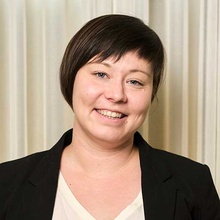
Blog: Eva-Stina Slotte 18.1.2023
The importance of connecting digital and green in 2023 — a local and regional perspective
This past year the Association of Finnish Local and Regional Authorities was excited to celebrate an important milestone in Brussels. As it has been 30 years since our Brussels’ office signed its first lease, we can proudly state that our Association has been in Brussels even before Finland joined the EU in 1995.
Of course, a lot has changed during these three decades in Brussels. Priorities have shifted, the common market has grown, and the EU has faced several challenges that set the tone for the way forward in an increasingly uncertain global setting. Europe has navigated through financial and energy crises as well as wars and pandemics. Yet, these difficulties have proved that together we are stronger and better able to face the challenges when society becomes more complex.
Considering the complexity of modern society, it is important to tackle issues not only multilaterally but also across sectors. The twin transition covering the road to a green and digital future is a good example of the EU making a great effort to recognise the need for a multisectoral approach. In my experience we still tend to label legislation as belonging strictly to a specific sector and to be discussed mainly by experts in that specific field. However, if we look at the Commission Work Programme 2023, we can see a shift in thinking.
Let me give an example. At first glance the section on the Digital Decade in the Commission Work Programme 2023 doesn’t seem to be so much about digitalisation, with initiatives covering for instance public health, SMEs relief and critical raw material. These topics can, however, be seen as vital for implementing digitalisation. Likewise, digital initiatives regarding cybersecurity or data rarely fall under one category but affect other sectors like energy, education, and mobility. The list is long and exemplifies how multisectoral in nature digital issues ultimately are.
On the topic of different sectors: During my five years in Brussels, I’ve noticed that the digital narrative often tends to be dominated by other sectors than the public sector. Yet many of the responsibilities and opportunities that come with new EU legislation on for instance artificial intelligence, are not only going to affect local and regional authorities, but also be implemented by them. I think we can agree on that all of society tends to feel the effects and benefits of technological advancement and the legislation that tries to keep up with these developments.
I want to underline the importance of engaging all sectors, including the local and regional level, in the debate here in Brussels.
By highlighting the need for a broad discussion on digital legislation, I want to underline the importance of engaging all sectors, including the local and regional level, in the debate here in Brussels.
A part of my work in Brussels has been to build a community to discuss upcoming digital legislation. Therefore, an informal digital network for the Finnish EU offices in Brussels was set up in 2021 to discuss legislative initiatives relating to the Digital Decade. The idea was to provide a forum for exchanging views. The talks have been organised together with different Finnish partners in Brussels, representing both the public and private sectors.
Although the talks have mainly been organised in Finnish and for a Finnish audience, we also organised an international seminar on Web 3.0 together with the Helsinki EU Office. It proved to be a timely discussion as virtual realities, along with Web 3.0, came up in the Commission Work Programme for 2023 not long after we started planning the seminar. The Commission is set to release its new policy on virtual worlds in the second quarter of this year.
With this in mind, and at the start of 2023, we may ask: Where is the EU standing on green and digital policy from a local and regional perspective? At least the question of subsidiarity needs to be an integral consideration in EU politics also moving forwards. This includes the digital sphere.